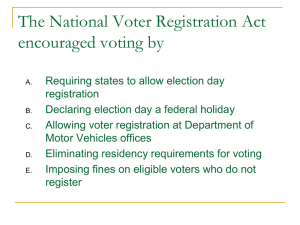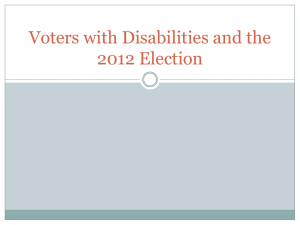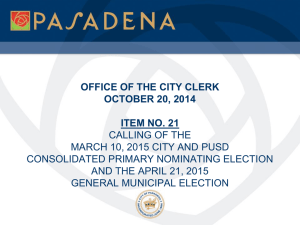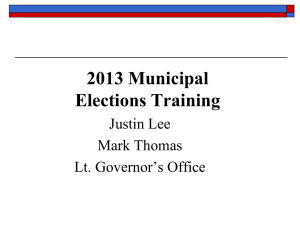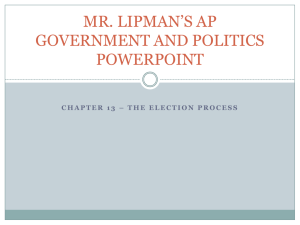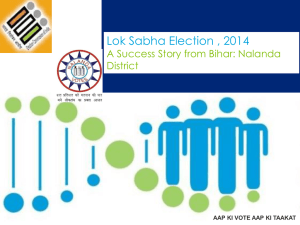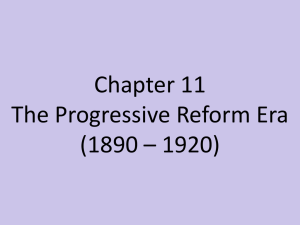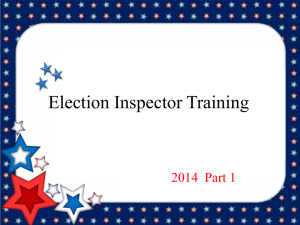SENTRI Act Analysis
advertisement
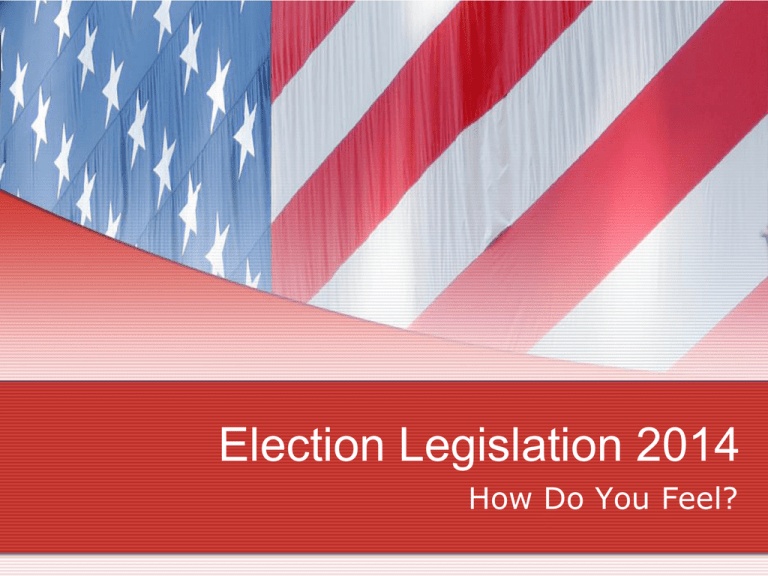
Election Legislation 2014 How Do You Feel? SENTRI Act – Cornyn & Schumer • Summary: Introduced in Senate (11/19/2013) • Safeguarding Elections for our Nation's Troops through Reforms and Improvements (SENTRI) Act - Amends the Uniformed and Overseas Citizens Absentee Voting Act, with respect to the regularly scheduled general election for federal office held in November 2014 and thereafter, to: SENTRI Act - Summary • require the chief election official of a state to report, not later than 43 days before any federal election held in the state, on the number of absentee ballots validly requested by absent uniformed services and overseas voters whose requests were received by the 46th day before the election, and whether such ballots were timely transmitted; SENTRI Act - Summary • eliminate the hardship waiver allowed for states from the requirement to provide absent members of the uniformed services and overseas voters abstentee ballots 45 days prior to an election; SENTRI Act - Summary • require express delivery of an absentee ballot that is not timely transmitted; • allow an absentee voter to use a single abstentee ballot application for subsequent elections; • make such Act applicable to the Commonwealth of the Northern Mariana Islands; SENTRI Act - Summary • modify reporting requirements to require a biennial report on the effectiveness of the federal voting assistance program; and • require the Comptroller General (GAO) to review and report on such biennial reports for elections occurring in calendar years 2014 through 2020. SENTRI Act - Summary • Directs the Secretary of Defense (DOD), in coordination with the Secretary of each military department, to: • (1) affirmatively offer, on an annual basis, each member of the Armed Forces on active duty (other than active duty for training) the opportunity, through an online system, to register to vote in a federal election, update voter registration information, or request an absentee ballot; • (2) implement an online system for such purpose; and • (3) implement a system to track a change of address or duty status of a member of the Armed Forces on active duty to provide an automatic notice to such member of voter registration requirements. SENTRI Act - Summary • Repeals the demonstration project allowing absent members of the uniformed services to vote in the regularly scheduled general election for federal office for November 2002 through an electronic voting system. SENTRI Act - Summary • Amends the Servicemembers Civil Relief Act to permit dependents of an absent member of the Armed Forces to retain residency status in their state for voting purposes. Bill sections: Section 101 • Section 101: Matters to be included: • ‘‘(i) Specific information about ballot transmission, including the total numbers of ballot requests received from such voters and ballots transmitted to such voters by the 46th day before the election from each unit of local government that will administer the election. • ‘‘(ii) If the chief State election official has incomplete information on any items required to be included in the report, an explanation of what information is incomplete information and efforts made to acquire such information. Bill Sections • ‘‘(2) POST ELECTION REPORT ON NUMBER OF ABSENTEE BALLOTS TRANSMITTED AND RECEIVED.—Not later than 90 days’’. • [NOTE: DoJ has distributed a sample of what they want reported and it is very short. But they don’t tell you that they can then request more information or that the reports may not be the same from election to election. • First option is to NOT require reports: having 10,000 jurisdictions report is unreasonable. • 2nd: change should be a restriction on what DoJ can require so the lawyers don’t go on “fishing expeditions”. • 3rd: if reports get Congressional support then recommendation is that we should ask Congress to SUNSET the reports after 8 years] Bill Sections: Section 102 • ‘‘(g) BALLOT TRANSMISSION REQUIREMENTS.— ‘‘(1) IN GENERAL.—For purposes of subsection (a)(8), in the case in which a valid request for an absentee ballot is received at least 46 days before an election for Federal office, the following rules shall apply: ‘‘(A) TRANSMISSION DEADLINE.—The State shall transmit the absentee ballot not later than 46 days before the election. [Note: by this language if the request comes on the 46th day, you must also transmit on the 46th day.] Bill Sections: Section 102 • ‘‘(B) SPECIAL RULES IN CASE OF FAILURE TO TRANSMIT ON TIME.— ‘‘(i) IN GENERAL.—If the State fails to transmit any absentee ballot by the 46th day before the election as required by subparagraph (A) and the absent uniformed services voter or overseas voter did not request electronic ballot transmission pursuant to subsection (f), the State shall transmit such ballot by express delivery. Bill Sections: Section 102 • ‘‘(ii) EXTENDED FAILURE.—If the State fails to transmit any absentee ballot by the 41st day before the election, in addition to transmitting the ballot as provided in clause (i), the State shall— ‘‘(I) in the case of absentee ballots requested by absent uniformed services voters with respect to regularly scheduled general elections, notify such voters of the procedures established under section 103A for the collection and delivery of marked absentee ballots; and ‘(II) in any other case, provide for the return of such ballot by express delivery. Bill Sections: Section 102 • ‘‘(iii) COST OF EXPRESS DELIVERY.— In any case in which express delivery is required under this subparagraph, the cost of such express delivery— • ‘‘(I) shall not be paid by the voter, and • ‘‘(II) may be required by the State to be paid by a local jurisdiction if the State determines that election officials in such jurisdiction are responsible for the failure to transmit the ballot by any date required under this paragraph. Bill Sections: Section 102 • ‘‘(iv) ENFORCEMENT.—A State’s compliance with this subparagraph does not bar the Attorney General from seeking additional remedies necessary to effectuate the purposes of this Act. • [NOTE: This leaves it wide open for AG and DoJ to require anything they desire. Likely that this is too open ended and gives DoJ too much latitude] Bill Sections: Section 102 • ‘‘(2) REQUESTS RECEIVED AFTER 46TH DAY BEFORE ELECTION.—For purposes of subsection (a)(8), in the case in which a valid request for an absentee ballot is received less than 46 days but not less than 30 days before an election for Federal office, the State shall transmit the absentee ballot not later than 3 business days after such request is received.’’. Bill Sections: Section 103 SEC. 103. TECHNICAL CLARIFICATIONS TO CONFORM TO 2009 MOVE ACT AMENDMENTS RELATED TOTHE FEDERAL WRITE-IN ABSENTEE BALLOT. • (a) IN GENERAL.—Section 102(a)(3) of the Uniformed and Overseas Citizens Absentee Voting Act (42U.S.C. 1973ff–1(a)(3)) is amended by striking ‘‘general elections’’ and inserting ‘‘general, special, primary, and runoff elections’’. Bill Sections: Section 104 • SEC. 104. TREATMENT OF BALLOT REQUESTS. (a) APPLICATION OF PROHIBITION OF REFUSAL OF APPLICATIONS ON GROUNDS OF EARLY SUBMISSION TO OVERSEAS VOTERS.—Section 104 of the Uniformed and Overseas Citizens Absentee Voting Act (42 U.S.C. 1973ff–3) is amended— Bill Sections: Section 104 ‘‘(b) APPLICATION TREATED AS VALID FOR SUBSEQUENT ELECTIONS.— • ‘‘(1) IN GENERAL.—If a State accepts and processes a request for an absentee ballot by an absent uniformed services voter or overseas voter and the voter requests that the application be considered an application for an absentee ballot for each subsequent election for Federal office held in the State through the next regularly scheduled general election for Federal office (including any runoff elections which may occur as a result of the outcome of such general election) and any special elections for Federal office held in the State through the calendar year following such general election, the State shall provide an absentee ballot to the voter for each such subsequent election. • [NOTE: This is the one that gets confusing to explain to young voters and leads to mailing to outof-date addresses. The language is confusing and can mean either 2 or 3 years depending on when elections are held.] Bill Sections: Section 104 • ‘‘(2) EXCEPTIONS.—Paragraph (1) shall notapply with respect to either of the following: • ‘‘(A) VOTERS CHANGING REGISTRATION.— A voter removed from the list of official eligible due to NVRA or • (B) Undeliverable ballots (mail or email) Bill Sections: Section 106 • SEC. 106. BIENNIAL REPORT ON THE EFFECTIVENESS OF ACTIVITIES OF THE FEDERAL VOTING ASSISTANCE PROGRAM AND COMPTROLLER GENERAL REVIEW. • ‘‘(C) The number of completed official postcard forms prescribed under section 101(b)(2) that were completed by absent uniformed services members and accepted and transmitted. • ‘‘(D) The number of absent uniformed services members who declined to register to vote under such sections.’’. Bill Sections: Section 201 ‘‘(a) IN GENERAL.—The Secretary of Defense shall carry out the following activities: • ‘‘(1) In coordination with the Secretary of each military department— • ‘‘(A) affirmatively offer, on an annual basis, each member of the armed forces on active duty (other than active duty for training) the opportunity, through the online system developed under paragraph (2), to— Bill Sections: Section 201 • ‘‘(i) register to vote in an election for Federal office; • ‘‘(ii) update the member’s voter registration information; or • ‘‘(iii) request an absentee ballot; • [NOTE: This is the section that election officials believe establishes Federal VR and CRS also states it does so;] Notes of Concerns: • If the intent is simply to allow the Federal government to develop a web portal that DEFERS to the state's registration process and laws, then the language needs to say that. As written, the implication is that the DoD system becomes a VR system of its own and even supplants state VR systems especially if there is no electronic VR in that state. • Even if the state has its own electronic VR system the legislation defines the limitation of items that can be used to those of the Federal NVRA form (see Page 17 Lines 18-24 and page 18) States now require a DMV match Notes of Concerns [For sometime now, there has been a consistent attempt by some Congressional staffers to establish the Federal NVRA form as the standard for voter registration; it appears to be an effort to say that no state can establish any requirements for registration that go beyond what appears on the Federal NVRA form. And since the EAC is the only agency that can change the form, and it would take 3 votes to do, then EAC essentially sets VR for all states.] Notes of Concerns • The concern here is that the language needs to be very clear to show that any Federal system is simply providing UOCAVA voters a method to more easily access a state's registration procedure and NOT a substitute for that state's laws. • It should not retain aggregated data on voters as a VR system and it should be imposed on DoD that it cannot, on its own, establish what data will be retained or populate fields: that data needs to come from the state itself and be under that specific state’s requirements for VR. Section 201 • ‘‘(2) Implement an online system that, to the extent practicable, is integrated with the existing systems of each of the military departments and that— • ‘‘(A) provides an electronic means for carrying out the requirements of paragraph (1); Section 201 • ‘‘(B) in the case of an individual registering to vote in a State that accepts electronic voter registration and operates its own electronic voter registration system using a form that meets the requirements for mail voter registration forms under section 9(b) of the National Voter Registration Act of 1993 to register to vote and request an absentee ballot— Section 201 • ‘‘(i) pre-populates such official postcard form with the personal information of such individual, and • ‘‘(ii)(I) produces the pre-populated form and a pre-addressed envelope for use in transmitting such official postcard form; or ‘‘(II) transmits the completed official postcard form electronically to the appropriate State or local election officials. Section 201 • ‘‘(3) Implement a system (either independently or in conjunction with the online system under paragraph (2)) by which any change of address by a member of the armed forces on active duty who is undergoing a permanent change of station, deploying overseas for at least six months, or returning from an overseas deployment of at least six months automatically triggers, through the Defense Enrollment and Eligibility Registration System or related systems, a notification via electronic means to such member that— Section 201 • ‘‘(A) indicates that such member’s voter registration or absentee mailing address should be updated with the appropriate State or local election officials; and • ‘‘(B) includes instructions on how to update such voter registration using the online system developed under paragraph (2). Bill Sections: Section 301 SEC. 301. REPEAL OF ELECTRONIC VOTING DEMONSTRATION PROJECT. • Section 1604 of the National Defense Authorization Act for Fiscal Year 2002 (42 U.S.C. 1973ff note) is repealed. • [NOTE: Kills off the provision allowing DoD and FVAP to experiment with electronic methods of voting for UOCAVA voters.] Bill Sections: Section 401 • SEC. 401. EXTENDING GUARANTEE OF RESIDENCY FOR VOTING PURPOSES TO FAMILY MEMBERS OF ABSENT MILITARY PERSONNEL. • [NOTE: Amends the Servicemembers Civil Relief Act to permit dependents of an absent member of the Armed Forces to retain residency status in their state for voting purposes.] HR775: Uninterrupted Elections Act • Sponsor: Rep Griffith, H. Morgan [VA-9] (introduced 2/15/2013) Cosponsors (8) • Uninterrupted Elections Act - Amends the federal judicial code to exempt an election and registration official, if named as a prospective juror under a random jury selection plan, from starting service as a juror during any election period (the period beginning 60 days before and ending 30 days after an election with respect to which the official has specified election duties). • Defines "election or registration official" as an appointed or elected local election administrator, or a permanent full-time employee of such an administrator, whose duties include theregistration of voters or the administration of elections. HR2115: Voter Registration Efficiency Act Sponsor: Rep Miller, Candice S. [MI-10] (introduced 5/22/2013) Cosponsors (3) • Voter Registration Efficiency Act - Amends the NVRA to require a state motor vehicle authority to require each individual applying for a motor vehicle driver's license in the state to: • (1) indicate whether the individual resides in another state or resided in another state before applying for the license, and, if so, to identify the state involved; and • (2)indicate whether the individual intends for the new state to serve as the individual's residence for federal voter registration purposes. • Requires the motor vehicle authority, if an individual indicates an intention for the new state to serve as the individual's residence for federal voter registration purposes, to notify the motor vehicle authority of the former state of residence, which shall notify the chief state election official of that state that the individual no longer intends for it to serve as the individual's residence for federal voter registration purposes. S2017: LINE Act of 2014 • Updated version of S58 introduced in 2013. • Lines Interfere with National Elections Act of 2014 or LINE Act of 2014 - Amends the Help America Vote Act of 2002 to require each jurisdiction where a substantial number of voters waited more than 30 minutes to cast a vote in the federal election held on November 6, 2012, or any federal election held after that date, to comply with a state remedial plan to minimize voter waiting times. • Hearing on bill in Senate Rules on March 12 What Happens To EAC? • Several bills introduced to kill the EAC • Changes to Senate Rules means Commissioners likely to be appointed this year.

